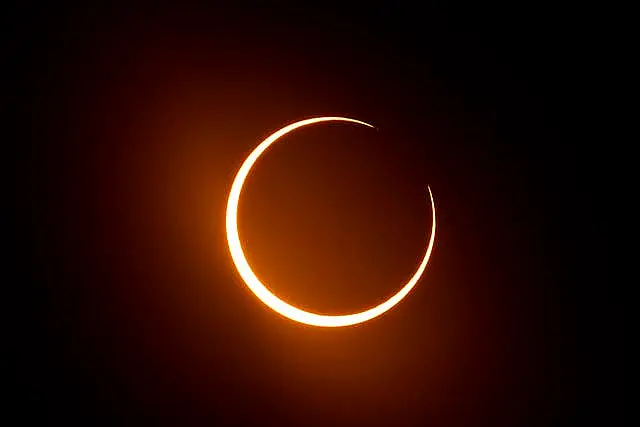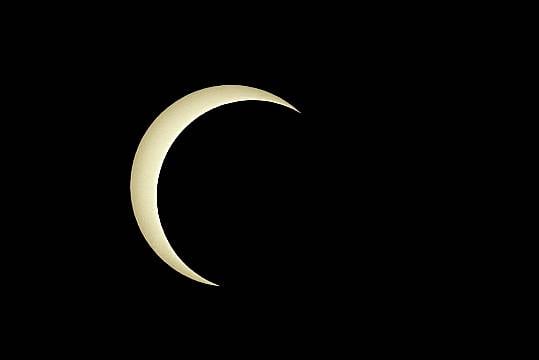Cheers have erupted among crowds in Oregon and New Mexico as a rare “ring of fire” eclipse of the sun put on a show for millions across the Americas.
With the presence of cloudy skies, a Nasa livestream of the phenomenon reported it in Eugene, Oregon, shortly after 9.15am local time (5.15pm BST).
This came more than an hour after a partial eclipse set in.
Come watch the eclipse with us!
We're streaming today's "ring of fire" eclipse—also known as an annular solar eclipse—with live updates from Oregon to Texas. #AskNASA your questions! https://t.co/m69JrxrMKS https://t.co/CRMmOdx9Fg— NASA (@NASA) October 14, 2023
Advertisement
For the small towns and cities along its narrow path, there was a mix of excitement, worries about the weather and concerns some spots would be overwhelmed by visitors flocking to see the celestial event, also called an annular solar eclipse.
Clouds and fog threatened to obscure the view of the eclipse in some western states, including California and Oregon.
As totality began in Eugene, Oregon, oohs and ahs combined with groans of disappointment as the eclipse was intermittently visible, the sun’s light poking through the cloud cover from behind the moon only at times.

In New Mexico, the sky was crystal clear, giving tens of thousands of spectators an unfettered view.
They received a double treat since the eclipse coincided with an international balloon fiesta that draws close to 100,000 spectators for early morning mass ascensions of hundreds of colourful hot air balloons.
Organisers gave out 80,000 pairs of viewing glasses on Saturday morning. There were hoots and yelps as the ring formed and hot air balloon pilots used their propane burners to shoot flames upward.
Unlike a total solar eclipse, the moon does not completely cover the sun during a ring of fire eclipse. When the moon lines up between Earth and the sun, it leaves a bright, blazing border.

Saturday’s path will take in Oregon, Nevada, Utah, New Mexico and Texas in the US, with a sliver of California, Arizona and Colorado. Following this, the eclipse will be seen in Mexico’s Yucatan Peninsula, Belize, Honduras, Nicaragua, Costa Rica, Panama, Colombia and Brazil. Much of the rest of the Western Hemisphere gets a partial eclipse.
The celestial event brought eclipse watchers from around the US to remote corners of the country to try to get the best view possible.
At Bryce Canyon national park in southern Utah tiny lights could be seen along a well known trail that snakes through a valley of red rock hoodoos as eclipse enthusiasts hit the trail before sunrise to stake out their preferred spots.
“I just think it’s one of those things that unites us all,” said John Edwards, a cancer drug developer who travelled alone across the country to try to watch the eclipse from Bryce Canyon.

“I just think it’s seeing these unique experiences that come rarely is what got me here. This is about as rare as it gets.”
Viewing all depends on clear skies — part of the US path could see clouds. Nasa and other groups livestreamed the event.
Viewers on the East Coast were prepared to see less of the event — close to a quarter eclipse around midday in some areas, such as New York City — but were nonetheless geared up to watch the skies.
Brazil’s Pedra da Boca state park, known for its rocky outcrops for climbing and rappelling was also expecting crowds.
The entire eclipse — from the moment the moon starts to obscure the sun until it is back to normal — is two and a half to three hours at any given spot. The ring of fire portion lasts from three to five minutes, depending on location.







